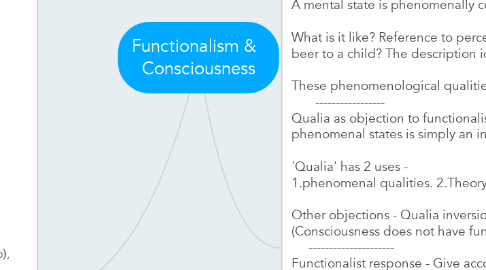Functionalism & Consciousness
by Anna Bromely

1. Functionalism Functional properties are possessed in virtue of what something does. Abstracted from material make-up - explains multiple realisability Inputs and Outputs characterise mental states (Applies to categories (be in pain) and individual (Paris is capital of France) mental states) Mental states are highly complex. Inputs & Outputs can be other mental states. Functionalists claim internal state causes other mental states and behaviour (Not entailed by functionalism, which would be Dennett's view) Functionalism antecedents: Behaviourism (what people do), Identity theory (mental states are inner states that cause behaviour), Put together (To be in particular mental state is to have some inner physical state) Functionalism is compatible with substance dualism because functionalism doesn't tell us what realizing states are. (Most functionalists are physicalists though) Most functionalists adopt token identity (respects multiple realizability). How to identify what mental property is? Functional role or what occupies functional role. Cognitive science proceeds on the idea that the functions that characterise mental states are computational. Challenges/Questions - 1.Can thought (meaning) just be understood in terms of causal-functional relations? 2.Can consciousness be understood in terms of causal-functional relations?
2. Phenomenal Consciousness Thinking about the mind in terms of what it does seems to leave out consciousness as something we experience A mental state is phenomenally conscious just in case there is some immediate subjective feel/quality to the state What is it like? Reference to perception/sensation/emotion... but shouldn't be comparative e.g how to explain taste of beer to a child? The description identifies the phenomenology of the experience. These phenomenological qualities are experienced, subjective qualities. ----------------- Qualia as objection to functionalism - Some mental states have phenomenal qualities. Can argue this is essence of phenomenal states is simply an intrinsic property (e.g. pain, smell) and not their causal functional role 'Qualia' has 2 uses - 1.phenomenal qualities. 2.Theory of phenomenal qualities as intrinsic Other objections - Qualia inversion - John Locke. Same functional role, different qualia. Absent qualia - Chinese mind (Consciousness does not have functional analysis?) So, Functionalism misses out on an important property of mind --------------------- Functionalist response - Give accounts of qualitative in terms of intentional content/representation - explain this in terms of functions. There is complexity here the functionalist can capture. But this doesn't show the phenomenal consciousness can be reduced to intentional content. An account just in terms of function is unsatisfactory. Dennett's defence of reductionism - Nothing has the 'special' properties of qualia. Inverted spectrum + (neurosurgery switches colours, but could be inverting all memory links) Chase and Sanborn - Coffee example. Can we meaningfully separate the taste and the response to the taste. - Then qualia are not intrinsic, but relational (e.g. in the case of first time tasting beer). The concept of qualia is radically ambiguous. Dennett's argument fails as it is dependant on memory. Change blindness contradicts this. You can fail to notice substantial changes in qualia. -------------------------- Conclusions - Qualia are poorly conceptualised. A subjects judgement about 'qualia' are no better than about room temperature. There is a unique way of representing phenomenal properties and we don't know how recognition occurs. Heterophenomenology - methods of objective science (text of what people say to create theoretical fiction of subject's world view experience. Chalmers - there is still basic intuition. Explaining function fails to explain phenomenal conscious experience.


